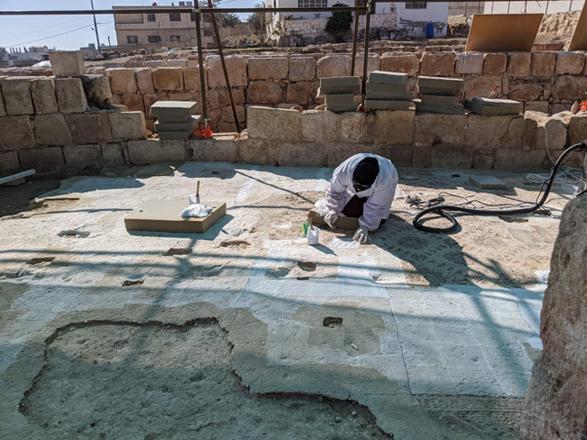You are here
Cash-for-Work activities in Petra benefit local community with support from UNESCO, Germany
Jul 29,2020 - Last updated at Jul 29,2020

Cash-for-Work team member Ibtisam Masadeh clears a trail, pushing a wheelbarrow full of shrubs (Photo courtesy of UNESCO)
AMMAN — A team of 28 Jordanians are hard at work in Petra this month, as part of an ambitious project carried out by UNESCO.
The project uses a Cash-for-Work (CfW) mechanism that links humanitarian and development assistance, mitigating the immediate need for employment creation for vulnerable individuals.
Khitmeh Jdeilat was born and raised in Umm Sayhoun. “I am enjoying learning new skills during these restoration works. Before joining the Cash-for-Work team, I was taking care of livestock and children. Now that I have an opportunity to earn an income, I hope to ensure that my children receive the education and lifestyle they deserve”.
The Cash-for-Work personnel in Petra completed their on-the-job training in June. The practical training concluded with a site visit to the Unayshu trail in Petra.
Workers cleared debris, rocks and plants, rehabilitating the trail to provide visitors to the UNESCO World Heritage Site with new opportunities to discover the “true value” of Petra.
Implemented by UNESCO with the German Agency for International Cooperation (GIZ), the project is part of the Federal Ministry of Economic Cooperation and Development, Germany (BMZ) Special Initiative “Tackling the root causes of migration, stabilising host regions, supporting refugees”. It aims to leverage culture to enhance resilience in local communities.
Ibtisam Masadeh, 48, is a widow and her family’s breadwinner. “It has been a challenging job, clearing the trails during this hot weather, but I am enjoying working with the team and seeing the improved presentation of the site. I am thrilled to be financially benefitting from the preservation of our culture and our home. We are taking care of our home when we preserve its heritage, showing our respect for Petra’s history.”
The project seeks to pave the way for longer-term investments in cultural heritage preservation, providing short-term employment opportunities to vulnerable Jordanians and Syrian refugees living in host communities located in the vicinity of the Petra World Heritage site and Rihab village.
These locations in North and South Jordan are rich in archaeological heritage.
Shaker Al Faqir, 33, works as a team leader, ensuring that CfW personnel are complying with the safety measures in place as a result of the COVID-19 pandemic.
“The communities surrounding Petra rely on tourism as their main source of income. Increasing their awareness of the importance of the site’s preservation and presentation will have a resounding positive impact”.
By promoting greater community engagement in the rehabilitation and conservation of the heritage sites in Jordan through this initiative, UNESCO aims to enhance awareness of heritage preservation, while demonstrating the potential of cultural heritage preservation as a sustainable and alternative income generating activity among a larger section of the local community.
Over the long term, the project aims to promote job creation within the cultural heritage sector, encouraging sustainable tourism, strengthening Jordan’s economy and improving the capacity of the local economy to absorb labour.
Throughout the project, it is estimated that up to 230 people will be engaged in CfW activities in Petra and Rihab village.
In July and August 2020, other CfW teams will be recruited and trained to support the rehabilitation of the back trail to the Monastery, clean the upper Siq plateau as rock fall risk preventive measure and preserve the precious Byzantine mosaics in Rihab.
For participants like Shaker, the work is having a deep and lasting impact.
“The project offers so much more than just compensation for our efforts; we are developing new skills, leaving an imprint on our home and fostering a positive narrative surrounding the preservation of our culture and heritage”.
(UNESCO contributed this article to The Jordan Times)
Related Articles
AMMAN — In the hills of Rihab, a village a few kilometres away from Mafraq, the remains of several ancient churches can be found, each with
AMMAN — The UNESCO Amman office and the German Agency for International Cooperation (GIZ) on Monday hosted a launch event in Petra commemora
AMMAN — After a busy morning of work along the back-trail to the Monastery in Petra, Yousef Ahmed Hasanat took a break in the shade to share

















